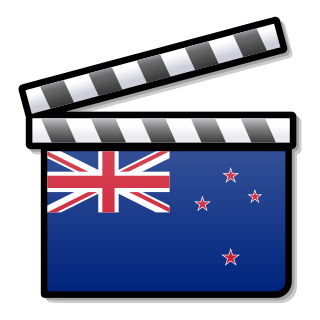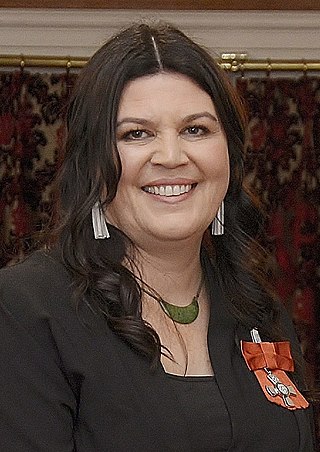Related Research Articles

New Zealand cinema can refer to films made by New Zealand-based production companies in New Zealand. However, it may also refer to films made about New Zealand by filmmakers from other countries. Due to the comparatively small size of its film industry, New Zealand produces many films that are co-financed by overseas companies.

Utu is a 1983 New Zealand war film about the New Zealand Wars. Co-written and directed by Geoff Murphy, the films stars Anzac Wallace, Bruno Lawrence, Tim Eliott, Ilona Rodgers, Wi Kuki Kaa and Merata Mita, and depicts the story of a Māori warrior who sets out on a quest for "utu" (revenge). Inspired by the events of Te Kooti's War, the film is set in 1870 in the North Island and has been described as a New Zealand Western.

Ngāti Porou is a Māori iwi traditionally located in the East Cape and Gisborne regions of the North Island of New Zealand. Ngāti Porou is affiliated with the 28th Maori Battalion, it also has the second-largest affiliation of any iwi, behind Ngāpuhi with an estimated 92,349 people according to the 2018 census. The traditional rohe or tribal area of Ngāti Porou extends from Pōtikirua and Lottin Point in the north to Te Toka-a-Taiau in the south. The Ngāti Porou iwi also comprises 58 hapū (sub-tribes) and 48 mārae.
John Dempsey O'Shea was a New Zealand independent filmmaker; he was a director, producer, writer and actor. He produced the only three feature films that were made in New Zealand between 1940 and 1970.

Nikola Jean Caro is a New Zealand film, television, and music video director and screenwriter. Her 2002 film Whale Rider was critically praised and won a number of awards at international film festivals. She directed the 2020 live action version of Disney's Mulan, making her the second female and the second New Zealand director hired by Disney to direct a film budgeted at over $100 million. Caro's works ranged from music videos, commercials, television dramas, and films, etc.
Tungia Dorothea Gloria Baker was a New Zealand actor, weaver, and administrator. Her notable acting roles included Ngahuia in the 1980s television drama Open House and Hira in the 1993 film The Piano. Baker was influential in contemporary Māori theatre, Māori film making and Māori arts. She named the Taki Rua Theatre, and was a founding member of Māori artists' collectives Te Manu Aute and Haeata.
Barry Ronald Barclay, MNZM was a New Zealand filmmaker and writer of Māori and Pākehā (European) descent.

Don Charles Selwyn was a Māori actor and filmmaker from New Zealand. He was a founding member of the New Zealand Māori Theatre Trust and directed the 2002 film Te tangata whai rawa o Weneti , the first Māori language feature film with English subtitles.

Wi Kuki Kaa was a New Zealand actor in film, theatre and television.
Tama Te Kapua Poata was a New Zealand writer, actor, humanitarian and activist. He was from the Māori tribe of Ngāti Porou. He was also known as 'Tom,' the transliteration of 'Tama.'
Merata Mita was a New Zealand filmmaker, producer, and writer, and a key figure in the growth of the Māori screen industry.
Katie Wolfe is a New Zealand Māori actor as well as a film and stage director. She has appeared in seminal local television series such as Marlin Bay (1990s), Shortland Street, and Mercy Peak. Her screen directing work has won awards, including Redemption at the ImagineNative Film + Media Arts Festival and This Is Her at the Prague International Short Film Festival. More recently she wrote and directed a stage play, The Haka Party Incident, that had its touring schedule affected by the Covid pandemic.
Arapera Hineira Blank was a New Zealand poet, short-story writer and teacher. She wrote in both te reo Māori and English, and was one of the first Māori writers to be published in English. Her work focussed on aspects of Māori life and the life of women. In 1959 she was awarded a special Katherine Mansfield Memorial Award for a bilingual essay. In 1986 she published a collection of poetry, and after her death her son published a further collection of her writing in 2015.
Archdeacon Hone Kaa was an Auckland-based Anglican church leader, child welfare advocate and social-justice campaigner. He was a Māori of Ngāti Porou and Ngāti Kahungunu descent.

Hohi Ngapera Te Moana Keri Kaa was a New Zealand writer, educator, and advocate for the Māori language. She was of Ngāti Porou and Ngāti Kahungunu descent.
Ernie Leonard was a New Zealand television presenter, wrestling commentator, and actor. He was well known to wrestling fans.

Ainsley Amohaere Gardiner is a film producer from New Zealand.
Albert Alexander Amahou Belz is a New Zealand actor, writer and lecturer.

Warrick 'Waka' Attewell is a New Zealand cinematographer who over a long career has worked on many notable film and television productions. He joined John O'Shea's Pacific Films early in his career where he worked on Tangata Whenua - the People of the Land (1974), directed by Barry Barclay, and written and presented by Michael King. Independently and through his production company Valhalla Films, Attewell has filmed and directed short films, features, documentary, music video's and commercials. Developing future film makers has been part of Attewell's career, teaching cinematography at various film schools in New Zealand. Attewell has also worked with many well known New Zealand personalities and entertainers including briefly with Billy T James on a commercial. Attewell was director of photography on the documentary about Billy T James called Billy T: Te Movie (2011). Most recently Attewell was cinematographer and concept director on the Undertow (2019) television series screened on Māori Television in New Zealand.
Helen Pearse-Otene is a New Zealand Māori playwright, film actor, author and psychologist.
References
- ↑ Martin, Helen; Edwards, Sam (1997). "New Zealand film, 1912-1996". Trove . Auckland ; Melbourne ; Oxford :Oxford University Press . Retrieved 13 January 2023. ISBN 0-19-558336-1
- ↑ "Ngāti | Film | NZ On Screen".
- ↑ "Background | Ngāti | Film | NZ On Screen".
- ↑ "Ngāti | Film | NZ On Screen".